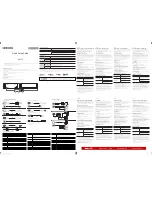
KFE-TNM-BA_IA-e-1610
15
6.8 Linearization
Linearity shows the greatest deviation of a weight display on the scale to the value of
the respective test weight according to plus and minus over the entire weighing
range.
If linearity deviation is discovered during a testing instrument control, you can
improve this by means of linearization.
•
Carrying out linearization is restricted to specialist staff possessing well
acquainted with the workings of weighing scales.
•
The linearisation is locked for verified weighing systems.
In order to unlock the access, the seal must be destroyed and the
jumper on the printed circuit board must be fitted (see chap. 6.9).
Attention:
After destruction of the seal the weighing system must be re-verified by
an authorised agency and a new verification wire/seal mark fitted before
it can be reused for applications subject to verification.
•
The test weights to be used must be adapted to the weighing scale’s
specifications; see chapter 3.4 “testing instruments control”.
•
Observe stable environmental conditions. Stabilisation requires a
certain warm-up time.
•
After successful linearization you will have to carry out calibration; see
chapter “testing instruments control”
Procedure:
Call-up menu setting
, see chap. 6.7.
Acknowledge with
.
Ensure that there are no objects on the weighing plate.
Wait for stability display „STABLE“, then press
. When
“LoAd 1“ is displayed, put the first adjustment weight (1/3
max) carefully in the centre of the weighing platform.
Wait for stability display „STABLE“, then press
. When
“LoAd 2“ is displayed, put the second adjustment weight
(2/3 max) carefully in the centre of the weighing platform.
Summary of Contents for KFE-TNM
Page 39: ......
















































